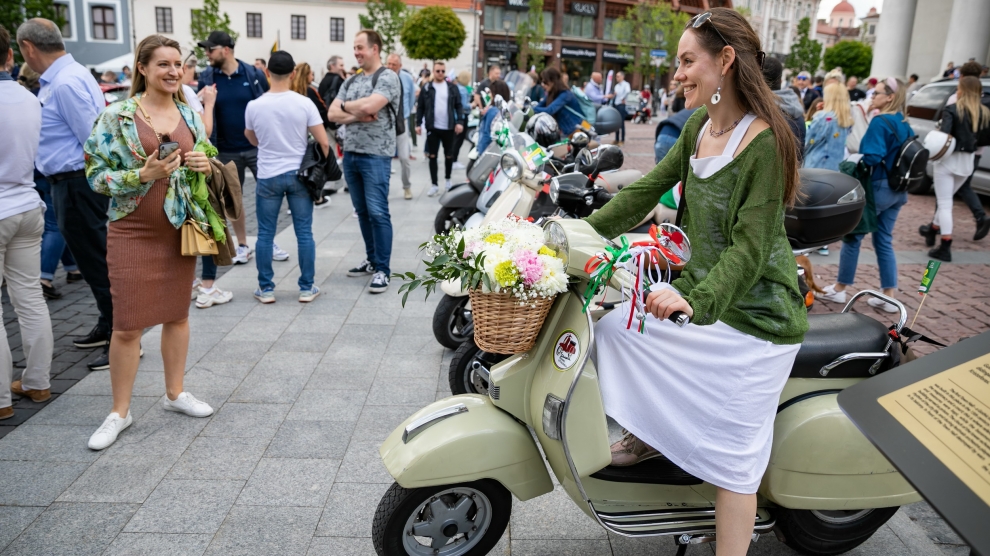The Lithuanian capital Vilnius, which has been making something of a name for itself over the past couple of months, coming up with a number of great initiatives to keep the city in the public eye during the Covid-19 pandemic, is now offering its citizens the chance to visit the world by doing nothing more than getting out and about on the city’s streets.
With much international travel still restricted because of pandemic, the city has decided to bring the world to Lithuania. Throughout the summer, the colours, aromas and sounds of the;s world cultures will create a unique experience for locals and visitors alike.
Lithuanians will gain knowledge of foreign lands just by visiting their capital. An Italian weekend has already swept through the city, and the cultures of India, the US, France, Spain, Germany and Japan are next on the list.
“Once again we have come up with a creative way to sustain tourism during the global Covid-19 pandemic,” says Remigijus Šimašius, the mayor of Vilnius.
“It is important to open the world experience to people who miss travel. That’s why we started this project. We want to provide positive emotions, such as the joy of travel and discovery of new cultures, in a healthy and safe environment.”
According to the mayor, many of the city’s tour operators, restaurants, hotels, transport operators and other businesses, as well as local communities and artists have joined in to create a series of unique experiences. The presentations of foreign cultures includes food experiences, concerts and exhibitions, educational events, special projects for children, thematic guided tours and other attractions.
“Businesses have not only created unique special programmes and events for our project, but have also adjusted their prices, making their services more affordable to local tourists,” explains Inga Romanovskienė, director of the official tourism agency of the city, Go Vilnius. “Quality hotels provide a unique opportunity to test their services. Thanks to railway, bus and parking operators, Vilnius has become more open and easy to reach during these weekends.”
She points out the success of the Italian weekend, which attracted hundreds of visitors to the city. Vespa scooters and a Venetian-carnival-themed performance in the artistic neighbourhood of Užupis were the most popular events.
Due to the Covid-19 quarantine and restrictions on gatherings, events have been dispersed around the city. This arrangement ensures that event attendee numbers do not exceed recommended limits.
The next themed weekend, which runs from June 19-21 will see Vilnius become Indian, with the US-themed and French weekends following in July.
In March, the Vilnius International Film Festival became one of the first film festivals to switch to a digital format in order to bypass lockdown restrictions, while a Vilnius-based photographer, Adas Vasiliauskas, started a series of playful photos he called Portraits of the Quarantine, which went viral around the world.
The city – which was one of the first in Europe to exit lockdown – has also opened up plazas, squares, and streets – otherwise off-limits – to allow businesses to conduct their activities during the quarantine.
Restaurants in the city have also come up with a novel way of using social distancing rules to become fashion displays for local designers. Since the country eased the restrictions on bars, cafes and restaurants to allow them to operate indoor seating areas, tables that otherwise must be kept empty have been used by mannequins to show off the season’s fashions.
Lithuania currently allows visitors from Germany, Poland, France, Italy, Finland, Norway, Denmark, Austria, Bulgaria, Croatia, Cyprus, Czechia, Estonia, Greece, Hungary, Iceland, Latvia, Liechtenstein, Luxembourg, the Netherlands, Romania, Slovakia, Slovenia, and Switzerland to enter the country without facing a period of quarantine.
People can also travel to Lithuania from Malta, Ireland, and Spain, but are required to self-isolate for two weeks. Meanwhile, all travel from Sweden, the United Kingdom, Portugal, and Belgium remains banned.
—
Photo: Go Vilnius
—
Unlike many news and information platforms, Emerging Europe is free to read, and always will be. There is no paywall here. We are independent, not affiliated with nor representing any political party or business organisation. We want the very best for emerging Europe, nothing more, nothing less. Your support will help us continue to spread the word about this amazing region.
You can contribute here. Thank you.







[…] Source link […]